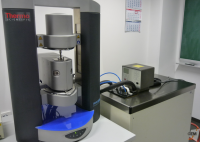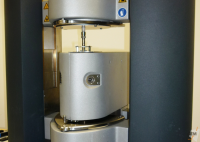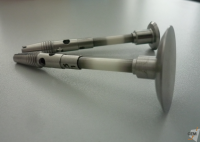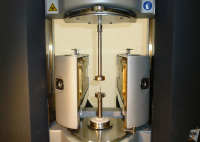RHEOLOGICAL CHARACTERIZATION
- MARS rheometer and refrigerated circulator
- MARS rheometer
- Plate-plate measuring geometry
- Ceramic shaft cone and plate
- Solid clamp measuring geometry
- Transparent solid specimen
Rheological measurements at CEM are performed in a controlled stress rheometer. A rotational controlled-stress rheometer consists of two symmetrical, coaxial geometries between which the molten or solid polymer to be measured is placed. One of the two geometries rotates while the other one remains at rest. An induction electrical motor applies a constant torque and a rotational optical encoder measures the rotational speed of the movable surface. The sample between the surfaces limits how fast and how much the movable geometry can rotate and these two parameters are related to the sample’s viscosity and compliance, respectively.
Our lab is equipped with three rotational rheometers:
- Anton Paar MCR 302
- Anton Paar MCR 702
- ThermoFischer Haake MARSII
RHC Laboratory can test polymeric materials in either molten or solid state for rheological properties in a wide range of temperatures and loading conditions. Rheological tests available:
- Viscosity measurements – η(ω, T) or η(shear rate, T); η = viscosity, T= Temperature, ω = angular frequency
- Dynamic measurements – J’(ω, T), J’’(ω, T), tan δ(ω, T); J’ = Storage compliance, J” = Loss compliance
- Long term creep measurements – J(t,T). δ = damping characteristic, J = Shear creep compliance
Contact:
Dr. Lidija Slemenik Perše
lidija.slemenikperse@fs.uni-lj.si
Telefone: 01 6207 100






